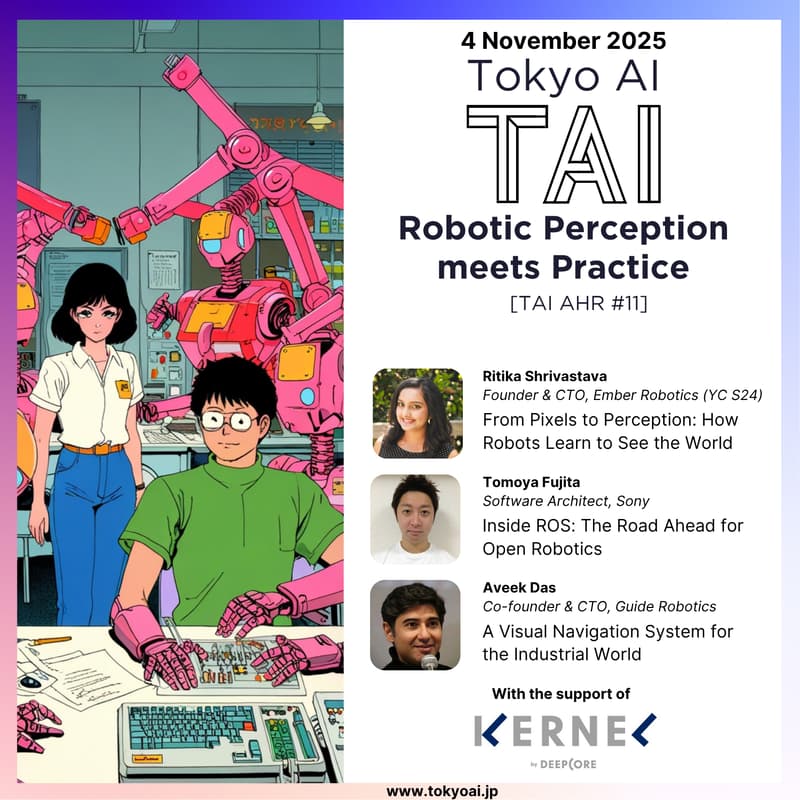

TAI AHR #11 - Robotic Perception meets Practice
Agenda
How do robots perceive, understand, and act in the real world? This event brings together leading voices from industry and open-source communities to explore the frontiers of robotic perception and intelligent control. From advances in Simultaneous Localization and Mapping (SLAM) to the ongoing evolution of the Robot Operating System (ROS), we’ll examine how breakthroughs in computer vision, sensor fusion, and collaborative software development are shaping the next generation of autonomous systems.
Speakers:
Talk 1 - From Pixels to Perception: How Robots Learn to See the World
Speaker: Ritika Shrivastava (Co-founder and CTO, Ember Robotics)
Abstract: Understanding the world around you is hard, especially for robots. Using computer vision and sensor data, robots can build a map of their surroundings and localize themselves within it, a process known as Simultaneous Localization and Mapping (SLAM). In this talk, Ritika will explore how SLAM allows robots to perceive, remember, and navigate the world, bridging perception and action. Drawing from her experience on Tesla’s Autopilot stack, she will also discuss what it takes to make SLAM work reliably in the real world, and how foundation models and multi-sensor fusion are shaping the future of robotic perception.
Bio: Ritika Shrivastava is the co-founder and CTO of Ember Robotics, a company building on-edge observability tools for robots. Ember Robotics was part of Y Combinator’s Summer 2024 batch. Before founding Ember, Ritika worked on Computer Vision Autonomy at Tesla Autopilot and taught robotics at the University of California, Berkeley, focusing on perception, controls, and optimization.
Talk 2 - Inside ROS: The Road Ahead for Open Robotics
Speaker: Tomoya Fujita (Software Architect, Sony)
Abstract: In this "State of ROS" presentation, we will review the progress within the ROS ecosystem over the past year, highlighting the successful launch and new capabilities introduced with our latest release, Kilted Kaiju. Tomoya will share the long-term vision for the project and offer a sneak peek at the exciting features planned for our next LTS release, Lyrical Luth. This presentation will also detail concrete opportunities for community members to get involved with the project and contribute to the planning and development of future ROS versions, helping shape the next generation of robotics software.
Bio: Tomoya Fujita, Software Engineer at Sony, is on the ROS Project Management Committee, core maintainer of ROS 2, Google Summer of Code mentor, and IEEE Robotics and Practice Senior Editor Board.
Talk 3 - A Visual Navigation System for the Industrial World
Speaker: Aveek Das (Co-founder and CTO, Guide Robotics)
Abstract: Reliable, low-cost spatial intelligence is a critical barrier for industrial automation. This talk introduces a unified visual navigation system designed for complex industrial environments. We leverage advanced computer vision, combining robust visual SLAM with stereo depth-based 3D reconstruction, to provide precise localization and environmental mapping. We will showcase the system's "plug and play" versatility across diverse applications, including warehouse material handling monitoring, tunnel infrastructure inspection, and agricultural robot navigation in restricted farms. A key focus is our optimization for the edge, enabling the full stack to run on low-cost, commodity hardware and integrate seamlessly with open-source frameworks like ROS.
Bio: Dr. Aveek Das is the Co-founder and CTO of Guide Robotics Inc., specializing in vision-based navigation for autonomous systems. His extensive background includes contributing to the DARPA Urban Challenge for self-driving, leading DoD robotics and navigation projects, and over 13 years of experience at SRI International. Dr. Das also co-founded area17, an autonomous indoor navigation spin-out from SRI International. A highly cited author in robotics with 2 U.S. Patents, he earned his PhD from the University of Pennsylvania's renowned GRASP Laboratory.
Tokyo AI (TAI) information
Tokyo AI (TAI) is the biggest AI community in Japan, with 2,400+ members mainly based in Tokyo (engineers, researchers, investors, product managers, and corporate innovation managers).
DEEPCORE information
DEEPCORE is a VC firm supporting AI Salon Tokyo. They operate a fund for seed and early-stage startups and KERNEL, a community supporting early entrepreneurs.